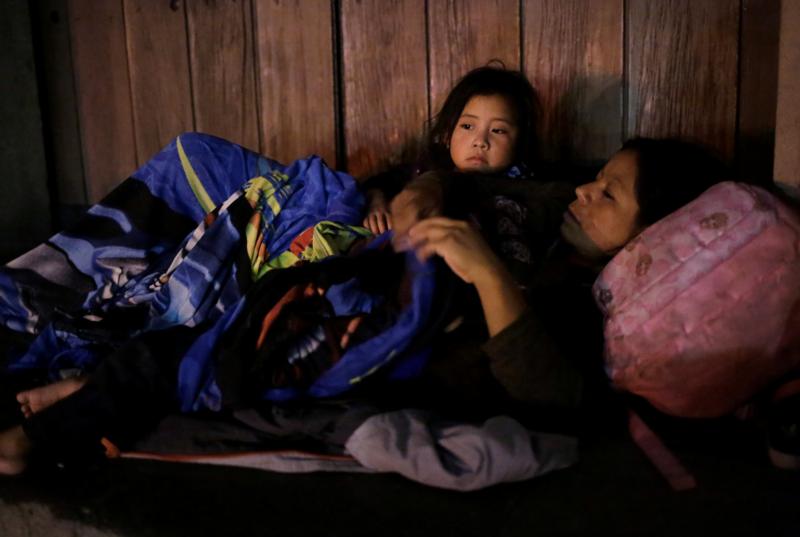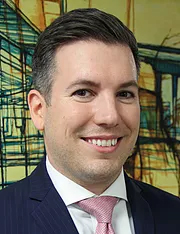
A migrant and her daughter rest outside Our Lady of Guadalupe Cathedral in Ciudad Juarez, Mexico, July 14, 2019. With the start of 2020, stricter immigration rules and higher processing fees will make U.S. citizenship, visas and asylum increasingly difficult to obtain. (CNS photo/Jose Luis Gonzalez, Reuters)
With the start of the new year – and as the U.S. bishops invite the faithful to celebrate National Migration Week (Jan. 5 to 11) – several changes in U.S. immigration law are set to take effect, including many designed to slow legal immigration by increasing fees and requirements.
Applicants will now pay anywhere from 60% to 83% more to file for U.S. citizenship through naturalization. In addition, the nation will become one of only four to charge asylum-seekers an application fee. Iran, Fiji and Australia impose similar costs.
(Related: Social justice speaker to discuss ‘promoting a church and world for all’)
Asylum-seekers are also facing increased waiting periods for work authorization. Those entering at the southern border must first prove they applied for asylum in at least one country through which they traveled; failure to do so results in a “mandatory bar to eligibility for asylum” in the U.S.
[hotblock]
Even those with brighter citizenship prospects now face higher hurdles. Permanent residents who apply for citizenship after December 2020 will take a more difficult naturalization civics test. Standards for “good moral character,” a key factor in citizenship applications, have been made more stringent – although many U.S. citizens themselves would fail to meet such criteria.
According to immigration attorney Christopher Casazza, “it’s getting insanely difficult” to become a U.S. citizen.
“The current administration is really strangling the immigration system,” said Casazza, a partner at the Philadelphia-based firm Solow, Isbell & Palladino, which represents a South Philadelphia couple whose detention by immigration authorities was recently featured in CatholicPhilly.com.
Those who favor more restrictive immigration policies often presume “there’s this mythical way to get in line and wait your turn to immigrate to the U.S.,” said Casazza, while “the majority of people in this world have absolutely no way to come to the U.S., even on a visitor visa.”

Immigration attorney Christopher Casazza says new rules are making it “insanely difficult” to become a U.S. citizen. (Courtesy of Solow, Isbell & Palladino)
Comparing U.S. immigration policies with their global counterparts, Casazza said that there’s a decided lack of reciprocity.
“As a U.S. citizen, you’re privileged in that you can pretty much travel to other countries without a visa, or obtain a visa if you need,” he said.
Given the U.S.’s rejection statistics for visas, however, “we have an open door to the world whereas the world does not have an open door to the U.S.,” he said. “Unless you’re from Western Europe or Japan, you’re looking a very high denial rate.”
Those who have applied for a U.S. permanent resident card (often called a “Green Card”) can face lengthy wait times ranging from seven to 22 years, depending on their country of origin, said Casazza.
At present, some 70 million worldwide have been forcibly displaced due to conflict, political instability, persecution and poverty. Pope Francis has stressed the importance of responding to migration issues with compassion and concrete action as part of Catholic social teaching.
Such an approach contrasts with U.S. immigration policy, which has historically been crafted “in response to xenophobia,” said Casazza. “With each new crop of immigrants, there was a fear that they would take jobs and land, so the laws were enacted.”
The first U.S. immigration law was the Naturalization Act of 1790, which allowed any free white person of “good character” who had been living in the U.S. for at least two years to apply for citizenship. Between 1820 and 1860, millions of Irish and German immigrants settled in the U.S.; by 1849, America’s first anti-immigrant, anti-Catholic political party, the Know-Nothings (so nicknamed for their initially secretive membership), had formed.
The 1882 Chinese Exclusion Act sought to bar immigrants who at the time represented only 0.002 percent of the population. A few years later, the Immigration Act of 1891 refused, among others, those who were mentally ill, poor or diseased.
[hotblock2]
Successive laws, such as the Quota Acts of 1921 and 1924, favored immigration from some European nations over others. After World War II, the U.S. maintained its existing quota system as it admitted some 350,000 of Europe’s seven million displaced persons under the Displaced Persons Act of 1948. The national origin quotas were later ended by the 1965 Immigration and Nationality Act (INA), which overhauled the U.S. immigration system.
Casazza said that immigration law often flies in the face of the reality behind population movements.
“If you were to talk to your ancestors, you’d find that the wealthy and the educated – the people with all the advantages in life – were not, by and large, immigrating to the U.S. in the 1800’s and 1900’s,” he said.
In his office, Casazza has hung a copy of the ship’s manifest documenting the arrival of his great-great-grandfather, a mason who immigrated to the U.S. in 1905 from Italy’s Liguria region.
“These were laborers, people who were here to do the hard work that nobody else wanted to do,” said Casazza. “That’s literally no different than what’s going on now.”
To better understand the immigration experience, Casazza suggested “finding our when and where you came from” by looking up family information using online resources such as Ancestry.com and the website for Ellis Island.
“Go and find those names etched into a manifest, and really consider where you came from,” he said.
In addition, he said, “talk to an immigrant.”
“They’re human beings,” said Casazza. “And if you show an interest, whether you’re speaking with a banker or a busboy, their stories will open your eyes.”
***
As part of its National Migration Week observance, the Catholic Coalition for Immigrants and Refugees will present “Promoting a Church and a World for All,” a talk by Sister of St. Joseph Carol Zinn, on Jan. 11 at 10 a.m. in the Archdiocesan Pastoral Center, located at 222 North 17th Street in Philadelphia.
PREVIOUS: No easy answers to homelessness, church workers say
NEXT: Local Catholic school awarded for savvy marketing



Share this story